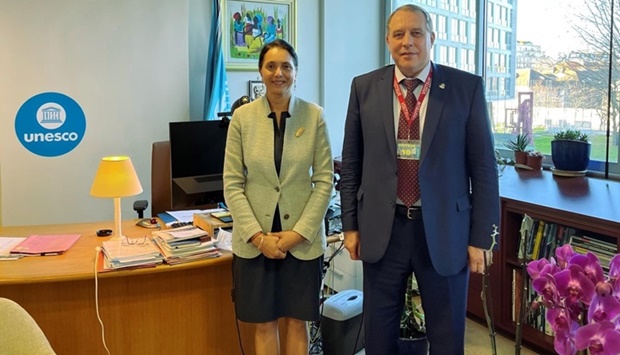During the meeting, the existing stream of collaboration and new areas of cooperation in the months ahead, particularly as the UN embarks on an ‘International Year of Basic Sciences for Sustainable Development’ in 2022 was discussed.
Sentyurin shared with Nair-Bedouelle an update on GECF’s activities, specifically those pertaining to the Forum’s involvement in the UN events, including the UN High-Level Dialogue on Energy, UNFCCC’s COP26, and UNECE sessions, as well as those related to the achievement of UN Sustainable Development Goals.
“Our 18 members, representing more than 70% of the proven natural gas reserves, have placed climate action at the forefront of their priorities by recognising the climate challenges, valuing the manifold efforts taken by the international community to counter the environmental issues and cementing role of natural gas complementing the expanding intermittent renewables in compliance with all major energy scenarios earnestly backcasting the achievement of sustainable development goals,” Sentryurin pointed out.
The Unesco official highlighted the commitment of the Natural Sciences’ division in building skills and competencies, the substance and mission of the World Engineering Day for Sustainable Development initiative, the role of science in overall progress, transition of technologies and knowledge, as well extension of support to the developing countries, particularly in Africa.
While underscoring the historical responsibility of developed nations to help developing nations adapt to climate change, Nair-Bedouelle reaffirmed Unesco’s faith in the GECF community to lead the way knowledge and technology transfer, as well as in the process of bringing wide-scale climate adaptation.
“Although the extent and speed of decarbonisation are different for countries, depending on the national circumstances, there is a real need for the energy industry to adapt and increase effort to mitigate its carbon footprint. The gas industry strives to improve its resilience and reduce its environmental impact” Sentyurin noted.
In the area of research and development, the GECF official illustrated the work of the recently-established GECF Gas Research Institute in Algeria and its Scientific Committee.
He noted that from its inception, the GRI received a total of 29 ideas out of which three are being researched for the past year.
GECF 'Global Gas Outlook 2050' now carries a dedicated technology advancement scenario, amongst others; he said and opined that this scenario allows observers to gauge the direction and impact of technology on the global society.
In the theme of science education and support to youth, Sentyurin recalled the efforts of his Secretariat to institute regular internships for qualified students, in addition to inviting young researchers and scientists to several of Forum’s events.
GECF Secretary General emphasised cooperation with the Saint Petersburg Mining University (SPMU), a premier education institute of higher and post-graduate education for the oil and gas as well as mining specialists, which also houses the UNESCO International Centre for Competence in Mining Engineering Education.
He suggested that a three-way GECF-Unesco-SPMU collaboration will create common approaches to educational standards and implementation of joint projects.
The GECF-Unesco MoU, signed in December 2020, seeks to bring the competencies of two organisations together in the areas of climate action, natural resources management, capacity-building, technical support, and sharing of expertise.
In respect to ‘Rigs-to-Reefs’ concept as part of protecting biodiversity and the environment, being covered by the MoU, Sentyurin highlighted a 'Coral Management Programme' being undertaken by Qatar, a GECF member country on protecting coral reefs.
The secretary general invited Unesco’s Natural Science division to support efforts to standardise GHG emissions measurement, which is currently gnawing at the industry in the absence of a unified methodology.

